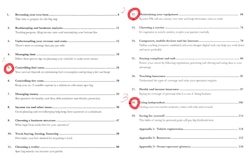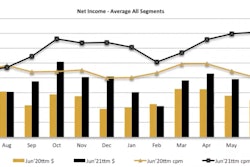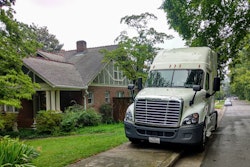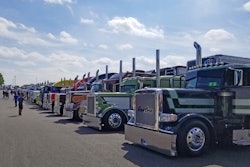Our memories are shorter than we want to believe, and it’s natural to place more value on the good things than the bad. Though every operation is different, this year I think has been a very good one for most truck owners. But where do you go from here -- continue with your own status quo or shake things up and pursue changes that might make things even better for your business?
Answers to those questions might be staring you in the face in the here and now. Yet there’s one source for those answers I know it’s plenty easy to totally forget about. Are you meeting the goals set out in your business plan?
When Marcia and I had the honor of being nominated for the Owner-Operator of the Year award in 2016, we had to submit a written copy of our business plan. This was a bit of a challenge at the time – we’d been in the trucking business already for 13 years. I felt like business was good, I’d developed a system that seemed to be working, and for the most part the day-to-day decisions had become fairly automatic in nature.
Now, years after starting our business, we had to define what we had been doing and where Marica and I planned to finish what we started.
I have to give all the credit to Marcia for deciding how we could simply explain our actions. Her education and background in nursing provided a platform on which we made sense of our journey, and it also forced us to face the reality that the finish line really wasn’t many years away at all.

After having experienced that process, I’d encourage you to see the real value in pursuing your own plan if you never had an actual written plan – and of dusting off the old one if it’s been sitting in a drawer since you got started.
Many owners have shared with me that they always wanted to put a plan to paper but just couldn’t seem to find the time or a way to make it happen. What I learned was that writing it always seems more difficult than it really is. A quick internet search for free business plan templates will provide links to thousands of variations, so we can’t use lack of examples as an excuse.
What’s stopping you? Here's a simple format that we used. It might provide a way forward for those among you who want to begin the road to ownership. If you’ve been an owner for a long time and never had a plan, this could help clarify your history as well as the roadmap toward fulfilling your ultimate business goals.
First, let’s define what a business plan is. It’s merely a document that sets out a business's objectives and strategies for achieving them.
[Related: A busy independent's plan to transition his four-truck business]
3 essential elements to keep it simple
- Goal -- what are you trying to do?
- Actions -- what you did or are going to do to reach the goal.
- Results -- what happened, and your evaluation of the outcome
Plans are what they are – as time and circumstances dictate, you’ll adjust and repeat this simple process. If you’re successful but never had a written plan, you’re probably already doing these things in your mind. But I’ll wager that by writing these thoughts down, you’ll help your business’s progress by facing the reality of the outcomes to avoid repeating missteps.
You don’t have to write a novel here, not even whole paragraphs. Using short statements or bullet points may be most effective in making your business plan useful as the business climate changes.
Here are a couple of examples of goals, actions and results from our own plan to get you started.
Goal: To obtain the best possible equipment with a payment no greater than $1000 per month.
Actions:- Research financing availability for a used power unit
- Determine appropriate makes and models in the $40K-$60K price range that are reliable, economical to maintain, aerodynamic and safe
Results:
- Met a salesperson that had the type of truck we wanted and could connect us with bank financing.
- Purchased a 2000 Freightliner Century for $48,000 with 300,000 miles, also the wheelbase on this truck allows me to negotiate in tighter spaces than some trucks. I need that for some customer service locations.
- Financed the purchase at a bank with a 60-month loan -- $900/month payment.
For an even simpler variation on this, an owner I’m helping recently took a huge step forward with their bookkeeping. Here’s how it was laid out in the plan:
Goal: Start filling out the income and expense spreadsheet weekly.
Action: Before beginning the new work week, enter the settlement and expenses.
Results: Now have current year-to-date profit, loss and up-to-date cost to operate, improving rate negotiations and making better load selections.
[Related: Capture 2020 vision with proactive attention to repair, operating and finance costs]
Business plan as accountability tool
In the two examples above you can distinctly see differences between the goals -- one is a large capital purchase with high risk, and the second may seem trivial to some. Yet the act of writing this down serves as a trigger or nudge to complete a necessary task.
You may think of items in a business plan as an accountability tool. What everyday pressures influence the decisions owners must make, whether related to purchases, savings and perhaps most importantly load planning? That’s just to mention a few areas. Are your business actions according to your plan or more of a habit, like a quick prioritizing reaction to the biggest bill that needs to be paid?
I’ve learned that the skills needed to self-dispatch, or effectively plan loads, can be the most difficult to master for owners. Yet those skills could well be the cornerstone of a fully-in-control owner’s day-to-day operation. I want to dive deeper into the world of self-dispatch soon in this column, but as I’ve been trying to write about that topic, I keep coming back to the problems encountered when an owner has not defined their business goals first. And everyone’s needs that drive the goals are, of course, different.
The need for planning never really ends. It could be a plan on how to sell your equipment or the business. Will you be able to retire on your own terms? The plans you need to make for your personal care and finances are important, too.
Though the examples above are geared toward very specific goals, it’s OK to write down your ultimate goal – the one that may seem far off in the future. Small business is more complex than what we experience day to day driving, loading, unloading and (knock on wood, but it happens) breaking down along the way. The current market opportunities evidenced by the recent ATBS midyear benchmark data have opened the door for many of you to advance to the next level in your plan. This market has also attracted many new people to become truck owners.
Whether you fit one of those descriptions or not, I’ll encourage you to ask yourself this question: “What will be the difference between the owners who thrive and those who do not?”
Todd Amen, ATBS President, offered some perspective on that very question in last week's live online seminar with Overdrive. Catch the replay for some of his answers, in part based on the high earners he knows among ATBS clientele.









